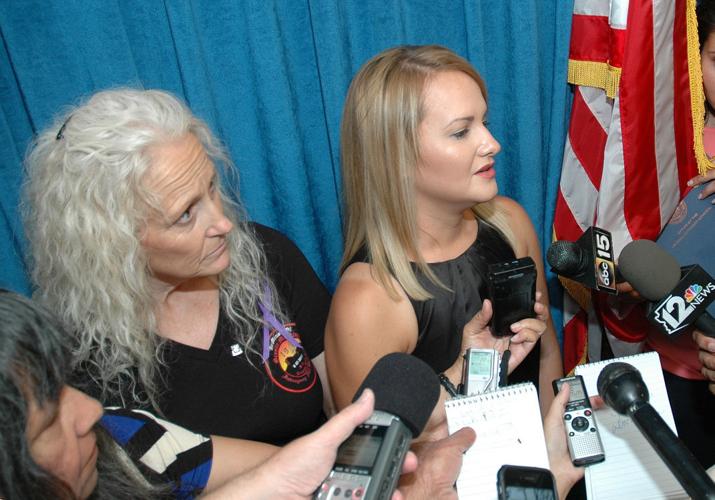PHOENIX — A dozen families of the 19 firefighters killed two years ago fighting the Yarnell Hill Fire have agreed to a settlement giving them just a fraction of what they were seeking from the state.
The deal announced Monday provides $50,000 for each of the 12 families who sued. The original claim that attorney Patrick McGroder had filed on their behalf totaled $220 million.
But Deborah Pfingston, who lost son Andrew Ashcraft in the blaze, said it was never about the money. Instead, she said, families want answers to what happened — and assurances that it won’t happen again.
“When our family hiked to the fatality site, I knew we needed to find truth and make changes to ensure that no other mother will hear the words that her son is not coming home,” Pfingston said at an afternoon press conference to provide details of the settlement. “It has been two long years of question, discovery, frustration and education.”
Roxanne Warneke, widowed when husband William “Billy” Warneke died in the blaze, echoed the sentiment.
“The lessons learned, the truth about the deaths of our sons, husbands and fathers will be coming,” said Warneke, who lives in the Avra Valley area on the northwest side.
And to show the case was never about the money, Warneke said she and several of the families are putting the money into a special fund.
“The organization will conduct independent investigations on fatalities, injuries, equipment and technology,” she said.
“We will be a wildland fire watchdog group where anyone can report to us anonymously to seek positive change in wildland firefighting,” Warneke continued. And she said the fund will offer scholarships for safety investigations and advocate for a wildland fire safety program at the state university system.
The deaths resulted when there was a change in wind direction, catching firefighters in an unburned area. Families charged that the state, which was supervising the effort, was negligent in supervising the blaze.
The families are getting other funds, though, with the state retirement system providing death benefits to survivors equal to 80 percent of what they were earning, plus health insurance.
Attorney General Mark Brnovich, who helped negotiate the agreement, said it was the right thing to do. He said that’s what makes the state different than an insurance company fighting every claim.
“We have an obligation when there are times when we can settle and resolve matters and hopefully prevent future tragedies from happening, we must do that,” he said. “And that’s what the settlement does.”
Money aside, Warneke said what the families also will get as a result of the settlement is “truth and transparency.”
Much of that, however, is dependent on promises that family members say they got from Jeff Whitney, appointed earlier this year as state forester. McGroder said he will not only provide whatever details his agency has about what happened on June 30, 2013, but also will make changes in how the state fights such blazes.
And the families were particularly happy that Whitney, who will be in charge of the state agency that fights such fires — and for whom the Granite Mountain Hotshots were working when they died — was a firefighter.
But what answers are available remains unclear.
Part of Monday’s deal includes the Industrial Commission dropping the maximum permissible $559,000 penalty it imposed on the state Forestry Division after the deaths, a penalty the state had challenged.
The settlement reduces that to $70,000 — $10,000 for each of the seven families that did not sue. More significant, it cancels a hearing set for later this year to determine whether violations of safety regulations led to the firefighters’ deaths.
But McGroder said he’s not sure those hearings would have provided any answers.
“Those who can tell us, those who can speak to it, are in heaven,” he said.
The Industrial Commission, however, insists it knows at least part of what happened and, more to the point, who was at fault.
In levying the maximum penalty in late 2013, commission members said they found two serious violations of worker safety regulations.
One is that at the time of the blaze, the state agency had vacancies in the positions of both safety officer and the planning section chief.
Marshall Krotenberg, the lead investigator for the commission’s Division of Occupational Safety and Health said that meant no one was available to pay attention primarily to the safety of the firefighters versus simply battling the blaze.
Commission members also said there was a failure to properly plan how to battle the blaze, especially after initial efforts at suppression failed.
But the most egregious violation, Krotenberg said, essentially came down to the Forestry Division having the wrong priorities.
“Folks were put in positions, overly hazardous positions, to protect property that was unprotectable under the current conditions of the extreme fuel, dryness, the drought and wind conditions,” he told the commission. “The employer implemented (fire) suppression strategies that prioritized protection of nondefensible structures and pastureland over firefighter safety.”
That, said Krotenberg, was a “willful” violation of worker safety laws.
Krotenberg stressed that, under state labor laws, that does not mean anyone at the Forestry Division intended to harm the firefighters or acted with a malicious intent. What it does mean, he said, is the Forestry Division knew what is required under the law, knew it was not following the requirement “and that they intentionally disregarded the requirement or acted with plain indifference to the safety of their employees.”
That conclusion was challenged by the state.





